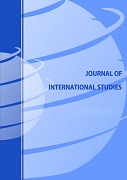The specialisation and sophistication of services exports: The case of the Visegrad countries
The specialisation and sophistication of services exports: The case of the Visegrad countries
Author(s): Piotr Gabrielczak, Kamila Kuziemska-PawlakSubject(s): Supranational / Global Economy, Economic history, International relations/trade, Economic development, Present Times (2010 - today)
Published by: Fundacja Centrum Badań Socjologicznych
Keywords: exports of services; revealed comparative advantage; export complexity; economic integration; Czechia; Hungary; Poland; Slovakia;
Summary/Abstract: This article analyses exports of services from Czechia, Hungary, Poland and Slovakia between 2010 and 2018, focusing on specialisation and sophistication, also known as complexity. The symmetric revealed comparative advantage index was used to determine fields of specialisation, and PRODY and EXPY indices were used to measure complexity. The results suggest that the Visegrad countries predominantly specialised in the export of relatively unsophisticated services compared to other European Union countries. Still, exports of services from the Visegrad countries were more complex than their real GDP per capita would suggest, and this sophistication is growing. This is due to the convergence of sophistication levels between service categories rather than advances in the structure of services exported by the Visegrad countries. Hence, integration with more developed European Union countries sustained existing fields of specialisation.
Journal: Journal of International Studies
- Issue Year: 14/2021
- Issue No: 3
- Page Range: 93-113
- Page Count: 21
- Language: English

